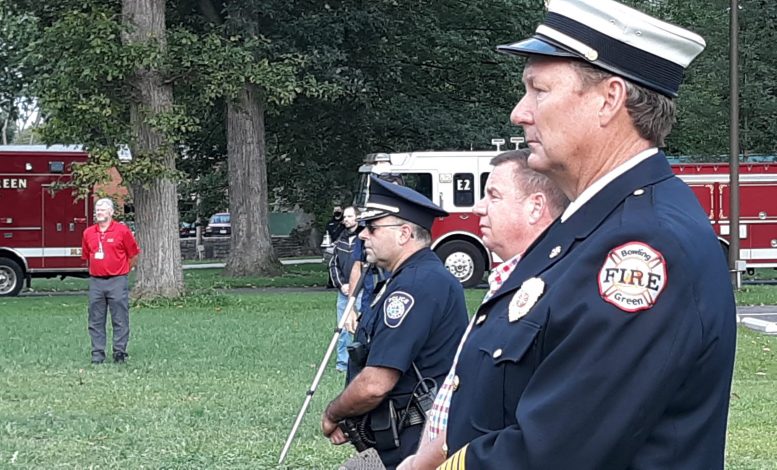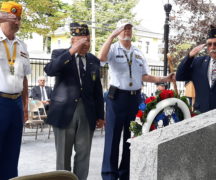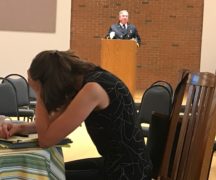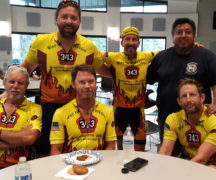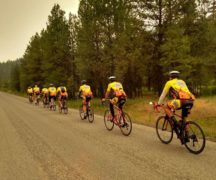By JAN LARSON McLAUGHLIN
BG Independent News
Anyone old enough to remember Sept. 11, 2001, also remembers where they were when the planes struck.
Even after two decades, the memories for many are vivid.
My coworkers and I were working in the newsroom, getting the paper ready for the daily 11 a.m. press run. Shortly after 9 a.m., we realized that day’s plans had to be scrapped. Some reporters began calling people they knew in New York City or Washington, D.C., to get some insight on what was happening, while others reached out to local officials to find out what the attacks meant to Wood County, Ohio.
We had little time to gather information – all the while keeping an eye on the newsroom TV, and putting our emotions on hold till after deadline.
I never imagined I would ever have to write a headline saying “U.S. under attack.”
This generation’s Pearl Harbor
Cathy Horger, of Bowling Green, remembers stopping in at the Haskins Post Office that morning 20 years ago. She had seen early images of the attack, but wasn’t sure what was going on.
She encountered a veteran in the Post Office.
“He put it in perfect perspective for me,” said Horger, who now works at Wood County Hospital. “He said, ‘this is your generation’s Pearl Harbor,’ and I have never forgotten that.”
At that time Horger was working at a job that she didn’t really enjoy.
“It had all the bells and whistles, but I did not like going to work,” she remembered.
“I only stayed with it for another few months after the attack,” she said. “I decided life was too short to waste time and energy on work that didn’t hold any real meaning for me.”
BGSU stayed open while most universities closed
Becca Ferguson was in a staff development meeting on conflict management at Bowling Green State University when the planes struck.
“We all stood watching the television in a residence hall,” she recalled. “I’ll never forget it.”
Unlike many universities that shut down in the shadow of the attacks, BGSU kept going.
“We were one of the few universities in the state to stay open,” Ferguson said.
Many classes shifted gears and addressed students’ concerns about the terrorist attacks. That proved to be a great decision, Ferguson said.
“We got a lot of positive feedback from our students,” she said.
Churches turned to Psalm 46
Pastor Gary Saunders was at his church in upstate New York that morning. His secretary said something about a plane hitting a building – but they had no TV in the church.
There was something even stronger in the reaction of New York state residents, Saunders recalled.
“The visceral reaction in New York state was palpable.”
By 1:30 that afternoon, people were standing in long lines to give blood. Hospitals 400 miles away from New York City were clearing the decks to make room to treat survivors who never came.
“There was a gut sense of we’re at war,” Saunders said. “Everyone stepped up as well as they could.”
As a pastor, Saunders’ previously prepared sermon was shelved. “Everything went out the window.”
Instead Saunders turned to the same scripture that he said half of the churches in the country relied on the Sunday after 9/11 – Psalm 46.
“It’s about God being our fortress and our rock.”
Clear skies and coming together
Chris Gajewicz was working as a naturalist at Wintergarden Park when he got a call about the first plane crashing.
“I thought it was an accident,” he said. He remembered thinking of the B-25 bomber that once hit the Empire State Building.
Later that day, after the nation learned it was not an accident, Gajewicz recalled standing in an open field in the park.
“I remember being out in the meadow, looking up, and you couldn’t see any plane trails,” he said. “Everything had been grounded.”
“It was shocking for everybody. So many people died when those buildings gave way,” he said.
Gajewicz also remembers how the nation came together that day and those that followed..
“Everybody put their personal interests aside,” he said.
Long lines for gas
Bowling Green Police Lt. Dan Mancuso was working midnight shifts 20 years ago. When he returned to work late on 9/11, he saw that many people were fearful about how the attacks might impact here.
“It was busy, mainly people creating long lines to get gas and blocking traffic,” he said.
Throughout Bowling Green, the police had to direct traffic around gas stations.
Law enforcement changed after 9/11 – with new procedures being adopted – some due to the attacks, Mancuso said.
‘I didn’t know it would consume 11 years of my life’
For Joe Fawcett, a member of the National Guard and Army ROTC at BGSU, everything changed 20 years ago.
“I remember hearing the news report of the first plane hitting,” then being glued to the news the rest of the day.
“I vividly remember watching President Bush’s speech to the nation,” said Fawcett, who is now director of public services for Bowling Green.
His ROTC battalion members met to discuss what the attacks meant for them.
“I remember thinking about quitting college and enlisting,” he said. “I remember being so angry.”
Fawcett spent the next years preparing for deployment and training others for deployment. He was deployed to Iraq from 2004-2007, then went back to the National Guard, where he trained for Afghanistan.
“I had wanted to be in the Army my whole life. I wanted to be a part of something,” Fawcett said. “I didn’t know it would consume 11 years of my life.”
School lessons stood still
Mark Hollenbaugh was teaching government and history at North Baltimore when the planes struck 20 years ago.
“It was obvious this wasn’t an accident,” he recalled. “There was no education the rest of the day.”
The high school didn’t have cable – just two TVs with rabbit ears.
“People were huddled around computers hitting ‘refresh,’” he said. “Everybody was fixated.”
Some parents picked up their children early, but many students remained at school.
“I remember them having a lot of questions,” Hollenbaugh said.
“Everyone’s life was turned upside down.”
Attack on home soil
Julie Baumgartner was working at DMC Consulting in Toledo that morning.
“I remember that when the first plane hit, we started watching the news coverage.” When the second one hit, “we knew there was something very wrong,” said Baumgartner, who is now co-director of the Wood County Board of Elections.
After 9/11, people seemed to be more wary and more aware of their surroundings.
“We were realizing now we could be attacked on our home soil,” he said.
Haunting voices of first responders
Ironically, Jeff Klein happened to be at a terrorism threat assessment training at the Wood County Emergency Management Agency that morning 20 years ago. He remembers an FBI agent checking his phone and leaving in the middle of the meeting.
That day changed emergency response for places like Perrysburg, where Klein was the assistant fire chief at the time.
“Up until 9/11 and the anthrax threats that followed, places like Perrysburg didn’t get invitations to go to national terrorism training,” said Klein, who is now Wood County’s EMA director.
“It changed the way we train for things,” he said. “For small town America, that stuff was never going to happen. It was eye-opening that it really can happen here.”
Throughout the nation, first responders started being more observant for possible threats.
“First responders are much more aware today,” Klein said. “I think people are much more inclined to say, ‘This doesn’t look right.’”
As a firefighter, Klein has strong memories of the tapes from the responding New York City fire trucks being released a few days later. The voices were haunting.
“You knew they were about to die,” Klein said.
Memories of past tragedies return for seniors
Jackie Metz was at the attorney’s office with her husband, Rick, for some business matters when the first plane struck. When she got back to her workplace at the Wood County Senior Center, the mood was subdued.
“When I walked back in the office, the building was somber,” she said.
“Everybody was glued to the TV. Everybody was aghast.”
Many of the seniors had been through the attack on Pearl Harbor and other tragedies.
“It evoked a lot of memories of their pasts,” Metz said.
What’s next?
CPA Jim Miles was in his office upstairs in the bank building in downtown Bowling Green, rushing to meet the Sept. 15 tax deadline. Then the planes struck, and the taxes would wait.
As a Navy veteran, Miles worried about further attacks.
“It strikes you as what’s step two here?” he remembered wondering.
Phone lines overwhelmed
Colleen Smith, retired municipal administrator for Bowling Green, felt a pit in her stomach when she learned of the attacks. Her sister had recently moved near New York City, and her brother-in-law was a roofer who often worked in the Big Apple.
“Immediately I felt panic. What if he’s in the city?” Smith said.
Phone lines were overwhelmed, and it took Smith hours before she could reach her sister and learned that her family was safe.
“She was devastated,” Smith said of her sister. “It was unbelievable.”

